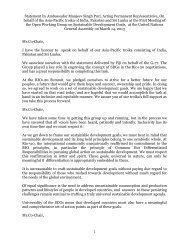STATE OF THE WORLD'S CITIES 2012/2013 Prosperity
STATE OF THE WORLD'S CITIES 2012/2013 Prosperity
STATE OF THE WORLD'S CITIES 2012/2013 Prosperity
Create successful ePaper yourself
Turn your PDF publications into a flip-book with our unique Google optimized e-Paper software.
State of the World’s Cities <strong>2012</strong>/<strong>2013</strong><br />
FACILITATING ACCESS TO ‘COMMONS’,<br />
PROvIDING PUBLIC GOODS, IMPLEMENTING<br />
SUSTAINABLE SOLUTIONS<br />
Facilitating Access to ‘Commons’: A prosperous city<br />
facilitates equitable access to the ‘commons’. These include<br />
water, air, biodiversity, knowledge and other shared<br />
resources, including public infrastructure, together with<br />
more intangible forms like a better environment, sense of<br />
identity and cultural and symbolic spaces that in principle<br />
belong to everyone.<br />
Cities with islands of prosperity tend to enclose the<br />
‘commons’, restrict their use to a selected few, or deplete<br />
them through unsustainable use.<br />
Prosperous cities require ‘commons resource pools’,<br />
which can take the form of institutional arrangements where<br />
conflicts are solved through negotiation, and consensus is<br />
built for decision-making. ‘Commons’ also include any legal<br />
or statutory provisions facilitating community participation<br />
in planning decisions, available quality information,<br />
transparency as well as cultural norms and social compacts.<br />
Some public goods, such as community civic centres,<br />
will often be found to function as ‘space commons’,<br />
facilitating the integration of marginal and voiceless groups,<br />
in the process promoting pluralism and diversity, which are<br />
inseparable from shared prosperity.<br />
Providing public goods43 : A prosperous city makes a<br />
profusion of public goods available to all: efficient public<br />
transport, educational<br />
opportunities, healthcare,<br />
quality public spaces such<br />
as libraries, recreation<br />
areas, parks and open<br />
spaces, etc. A substantial<br />
part of urban well-being<br />
is derived from access to<br />
and consumption of these<br />
public goods, which in<br />
principle must be ‘nonexcludable’<br />
(everyone can<br />
enjoy their benefits) and<br />
‘non-rivalry’ (individual<br />
consumption of the good<br />
does not decrease the<br />
amount available for<br />
consumption by others). 44<br />
POLICy<br />
Enclaves of prosperity<br />
‘fence in’ or restrict the<br />
availability of public goods,<br />
UN-Habitat’s<br />
reinvigorated<br />
notion of urban planning<br />
involves sustainable use<br />
and equitable access to<br />
the ‘commons’ through<br />
appropriate policies and<br />
schemes.<br />
In general, the<br />
FACT production AND<br />
enjoyment of public goods<br />
rely on a set of ‘commons’<br />
such as better connectivity,<br />
public security and safety,<br />
predictability, property rights<br />
under their various forms,<br />
street nomenclature, etc.<br />
112<br />
concentrating public investment in selected areas only,<br />
limiting access and privatizing control over a number of<br />
such goods.<br />
The provision of public goods contributes to<br />
economic advancement with environmental preservation<br />
and quality of life, which, incidentally, are fundamental<br />
‘smart growth’ concerns, too. 45 Bogotá has transformed<br />
its own landscape with a variety of public goods such as<br />
multi-modal transport, social infrastructure and quality<br />
public spaces that have contributed to sharing more of<br />
the benefits of prosperity with poor and middle-income<br />
neighbourhoods. Still in Colombia, Medellín has resorted<br />
to bold civic architecture, public spaces and other public<br />
goods in a bid to enhance collective prosperity. Involvement<br />
of urban planning with education, culture, infrastructure,<br />
safety and community development has enabled the<br />
municipality to connect poor barrios (which, according to<br />
the head of municipal planning, “always had lots of energy,<br />
but were disconnected from the city”) with more affluent<br />
neighbourhoods, in the process planting the seeds of mutual<br />
trust and expanding shared prosperity. 46<br />
Acting from the ‘hub’ of the ‘wheel for prosperity’,<br />
urban planning can identify strategies and plan for optimal<br />
production of public goods, in the process contributing<br />
to social capital, enhancing sense of place, safety and<br />
security, integrating social groups (e.g., youth), and<br />
increasing the economic value of the areas where these<br />
goods are provided. This strategy can generate widespread<br />
benefits to all urban residents, expanding prosperity across<br />
different areas. Such prosperity in turn can be leveraged for<br />
maintenance and further enhancement of public goods.<br />
Implementing Sustainable Solutions: Prosperous cities<br />
must plan and implement a variety of technical solutions<br />
to improve the functionality of the city and achieve a<br />
sustainable urban form.<br />
Although solutions can<br />
vary according to local<br />
conditions, UN-Habitat POLICy has identified a number<br />
of key interventions in<br />
various areas to assist the<br />
transition away from the<br />
current “Global Standard<br />
Urbanization Model of the<br />
20th Century” (GS20C),<br />
which is unsustainable<br />
on many accounts, to the<br />
city of the 21st century.<br />
A<br />
reinvigorated<br />
notion of urban planning<br />
would give any city<br />
tighter public control<br />
over the use of land,<br />
change the form and<br />
function of cities<br />
based on sustainable<br />
development principles,<br />
as well as expand the<br />
provision of, and access<br />
to, public goods.



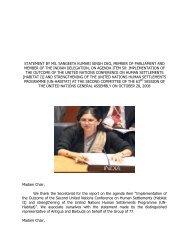
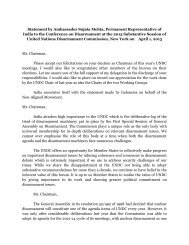
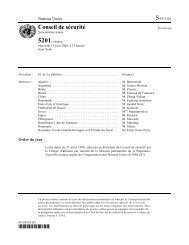
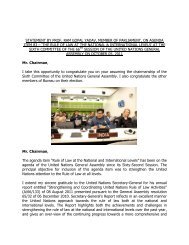
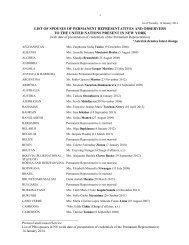
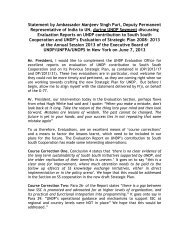
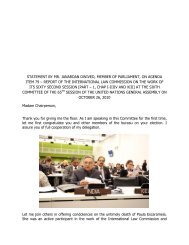
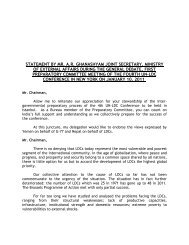
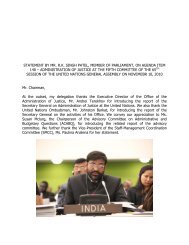
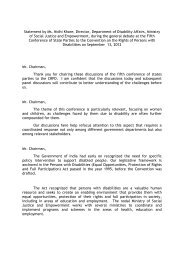
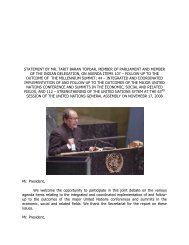
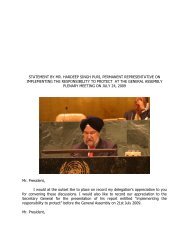
![1 statement by dr.[mrs] kakoli ghosh dastidar - Member States Portal](https://img.yumpu.com/27526598/1/190x245/1-statement-by-drmrs-kakoli-ghosh-dastidar-member-states-portal.jpg?quality=85)
